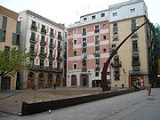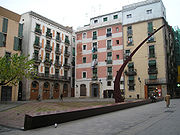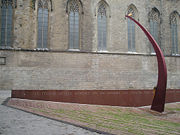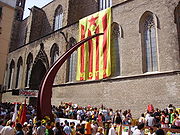
Fossar de les Moreres
Encyclopedia



Barcelona
Barcelona is the second largest city in Spain after Madrid, and the capital of Catalonia, with a population of 1,621,537 within its administrative limits on a land area of...
(Catalonia
Catalonia
Catalonia is an autonomous community in northeastern Spain, with the official status of a "nationality" of Spain. Catalonia comprises four provinces: Barcelona, Girona, Lleida, and Tarragona. Its capital and largest city is Barcelona. Catalonia covers an area of 32,114 km² and has an...
, Spain
Spain
Spain , officially the Kingdom of Spain languages]] under the European Charter for Regional or Minority Languages. In each of these, Spain's official name is as follows:;;;;;;), is a country and member state of the European Union located in southwestern Europe on the Iberian Peninsula...
), adjacent to the basilica of Santa Maria del Mar
Santa Maria del Mar (Barcelona)
This article is about the church in Barcelona. For other uses, see Santa María del Mar .Santa Maria del Mar is an imposing church in the Ribera district of Barcelona, Spain, built between 1329 and 1383 at the height of Catalonia's maritime and mercantile preeminence...
. The plaza was built over a cemetery
Cemetery
A cemetery is a place in which dead bodies and cremated remains are buried. The term "cemetery" implies that the land is specifically designated as a burying ground. Cemeteries in the Western world are where the final ceremonies of death are observed...
where defenders of the city were buried following the Siege of Barcelona
Siege of Barcelona
The Siege of Barcelona was a battle at the end of the War of Spanish Succession , which pitted Archduke Charles of Austria The Siege of Barcelona was a battle at the end of the War of Spanish Succession (1701–1714), which pitted Archduke Charles of Austria The Siege of Barcelona was a battle at...
at the end of the War of the Spanish Succession
War of the Spanish Succession
The War of the Spanish Succession was fought among several European powers, including a divided Spain, over the possible unification of the Kingdoms of Spain and France under one Bourbon monarch. As France and Spain were among the most powerful states of Europe, such a unification would have...
in 1714. The plaza retains its everyday use as a public space, but also prominently features a memorial to the fallen Catalans of the war, with a torch of eternal flame
Eternal flame
An eternal flame is a flame or torch that burns day and night for an indefinite period. The flame that burned constantly at Delphi was an archaic feature, "alien to the ordinary Greek temple"....
and a heroic poem by Frederic Soler, "El Fossar de les Moreres".
In the aftermath of the War of Spanish Succession, Catalonia suffered a loss of autonomy. The subsequent royal decree
Decree
A decree is a rule of law issued by a head of state , according to certain procedures . It has the force of law...
s known as the Decretos de Nueva Planta abolished the furs (fueros) of Catalonia as well as institutions that dated back to the time of the Crown of Aragon
Crown of Aragon
The Crown of Aragon Corona d'Aragón Corona d'Aragó Corona Aragonum controlling a large portion of the present-day eastern Spain and southeastern France, as well as some of the major islands and mainland possessions stretching across the Mediterranean as far as Greece...
and beyond. At a later date the public use of the Catalan language
Catalan language
Catalan is a Romance language, the national and only official language of Andorra and a co-official language in the Spanish autonomous communities of Catalonia, the Balearic Islands and Valencian Community, where it is known as Valencian , as well as in the city of Alghero, on the Italian island...
was banned for public documents. These actions by Philip V have two interpretations. First there was an obvious desire to punish for the support that was offered to Archduke Charles
Charles VI, Holy Roman Emperor
Charles VI was the penultimate Habsburg sovereign of the Habsburg Empire. He succeeded his elder brother, Joseph I, as Holy Roman Emperor, King of Bohemia , Hungary and Croatia , Archduke of Austria, etc., in 1711...
. Territories in Spain that supported Philip V had a less severe restriction of their historical fueros. Second, Philip V was initiating in Spain a greater concentration and centralization of power that was occurring simultaneously in the other major European monarchies, namely Great Britain
Kingdom of Great Britain
The former Kingdom of Great Britain, sometimes described as the 'United Kingdom of Great Britain', That the Two Kingdoms of Scotland and England, shall upon the 1st May next ensuing the date hereof, and forever after, be United into One Kingdom by the Name of GREAT BRITAIN. was a sovereign...
, France
Kingdom of France
The Kingdom of France was one of the most powerful states to exist in Europe during the second millennium.It originated from the Western portion of the Frankish empire, and consolidated significant power and influence over the next thousand years. Louis XIV, also known as the Sun King, developed a...
, and Austria
Habsburg Monarchy
The Habsburg Monarchy covered the territories ruled by the junior Austrian branch of the House of Habsburg , and then by the successor House of Habsburg-Lorraine , between 1526 and 1867/1918. The Imperial capital was Vienna, except from 1583 to 1611, when it was moved to Prague...
. The Decretos dealt not only with Catalonia, but also with other parts of Spain and the empire
Spanish Empire
The Spanish Empire comprised territories and colonies administered directly by Spain in Europe, in America, Africa, Asia and Oceania. It originated during the Age of Exploration and was therefore one of the first global empires. At the time of Habsburgs, Spain reached the peak of its world power....
as a whole. Philip V sought to regulate what had been a complex and sometimes conflicting polysynodal system of governance that characterized the first two centuries of the unified Spanish monarchy.
Given this tumultuous history connected with the decrees and the war, the Fossar de les Moreres is an important place of remembrance every year during the National Day of Catalonia
National Day of Catalonia
On September 11, Catalonia commemorates the 1714 Siege of Barcelona defeat during the War of the Spanish Succession. As correction for their support to the claim of Habsburg Archduke Charles to the throne of Spain, institutions and rights of the territories of the Crown of Aragon were abolished by...
(Diada Nacional de Catalunya in Catalan). The holiday commemorates the date on which Barcelona fell, 11 September, and some Catalans yearly pay homage to the defenders of city who were killed and are buried at the memorial.
The original cemetery in which Barcelona's defenders were buried was paved over, and the plaza was created during the urbanization of parochial cemeteries in 1821 under pressure from King Charles III of Spain
Charles III of Spain
Charles III was the King of Spain and the Spanish Indies from 1759 to 1788. He was the eldest son of Philip V of Spain and his second wife, the Princess Elisabeth Farnese...
and General Castaños.
See also
- History of CataloniaHistory of CataloniaThe territory that now constitutes the autonomous community of Catalonia in Spain, and the adjoining Catalan region of France, was first settled during the Middle Palaeolithic...
- Decrets de Nova PlantaNueva Planta decreesThe Nueva Planta decrees were a number of decrees signed between 1707 and 1716 by Philip V—the first Bourbon king of Spain—during and shortly after the end of the War of the Spanish Succession which he won....
- War of the Spanish SuccessionWar of the Spanish SuccessionThe War of the Spanish Succession was fought among several European powers, including a divided Spain, over the possible unification of the Kingdoms of Spain and France under one Bourbon monarch. As France and Spain were among the most powerful states of Europe, such a unification would have...
- Catalan nationalismCatalan nationalismCatalan nationalism or Catalanism , is a political movement advocating for either further political autonomy or full independence of Catalonia....

